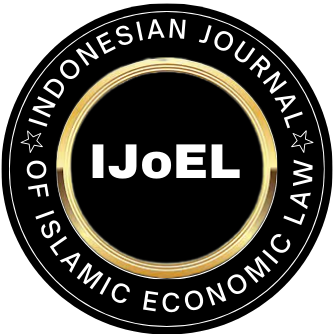Legal Disruption and Sharia Arbitration: Navigating Change, Measuring Impact, and Fostering Innovation
DOI:
https://doi.org/10.23917/ijoel.v1i1.3436Keywords:
Legal Disruption, TRIZ Method, Smart Contracts, Digital Innovation, Legal DoctrinesAbstract
This article evaluates the doctrinal challenges encountered by the law amid technological advancements, specifically in the areas of blockchain technology, smart contracts, digital assets, and data privacy. Certain conventional legal doctrines, including intellectual property law, privacy, and evidence, and the principle of nonrefoulement, may no longer be applicable amidst the introduction of disruptive technological developments. We present methods for identifying irrelevant legal issues using the TRIZ approach, which enables the identification, evaluation, and updating of legal doctrine. Additionally, this article illustrates how TRIZ principles can develop more adaptable contract principles in response to technologies such as smart contracts. By applying these principles, the law can more effectively manage change, promote innovation in consumer protection, and support the use of smart contracts.
Downloads
References
Alexander, C. (2023). Unfair Commercial Practices and Individual Consumer Claims for Damages - The Transposition of Art. 11a UCP Directive in Germany and Austria. GRUR International, 72(4), 327-336, ISSN 2632-8623, https://doi.org/10.1093/grurint/ikac152
Ante, L. (2021). Smart contracts on the blockchain – A bibliometric analysis and review. Telematics and Informatics, 57, ISSN 0736-5853, https://doi.org/10.1016/j.tele.2020.101519
Aziz, M. A., & Sasongkojati, F. B. (2022). The effectiveness of Sharia economic dispute resolution between the religious court and National Sharia Arbitration Board. Journal of Islamic Economic Laws, 5(2), 216–245. https://doi.org/10.23917/jisel.v5i2.19709
Capano, G. (2020). The Knowns and Unknowns of Policy Instrument Analysis: Policy Tools and the Current Research Agenda on Policy Mixes. SAGE Open, 10(1), ISSN 2158-2440, https://doi.org/10.1177/2158244019900568
Centobelli, P. (2022). Blockchain technology for bridging trust, traceability and transparency in the circular supply chain. Information and Management, 59 (7), https://doi.org/10.1016/j.im.2021.103508
Chalmers, D. (2022). Beyond the bubble: Will NFTs and digital proof of ownership em-power creative industry entrepreneurs? Journal of Business Venturing Insights, 17, ISSN 2352-6734, https://doi.org/10.1016/j.jbvi.2022.e00309
Driesen, D. (2015). 2 The sleeping giant awakes?: US actions to mitigate climate disruption. Legal Regimes for Environmental Protection, 23–36. https://doi.org/10.1163/9789004302839_004
Gezari, S. (2021). Tidal Disruption Events. Annual Review of Astronomy and Astrophysics, 59, 21-58, ISSN 0066-4146, https://doi.org/10.1146/annurev-astro-111720-030029
Giraudo, M. (2022). On legal bubbles: some thoughts on legal shockwaves at the core of the digital economy. Journal of Institutional Economics, 18(4), 587-604, ISSN 1744-1374, https://doi.org/10.1017/S1744137421000473
Giraudo, M. (2022). On legal bubbles: some thoughts on legal shockwaves at the core of the digital economy. Journal of Institutional Economics, 18(4), 587-604, https://doi.org/10.1017/S1744137421000473
Goriacheva, A.I. (2022). Modification or termination of contracts due to international economic sanctions from the standpoint of Russian legislation and court practice. Vest-nik Sankt-Peterburgskogo Universiteta. Pravo, 13(4), 877-895, https://doi.org/10.21638/spbu14.2022.403
Guo, H. (2022). A survey on blockchain technology and its security. Blockchain: Research and Applications, 3(2), ISSN 2096-7209, https://doi.org/10.1016/j.bcra.2022.100067
Hameed, A. (2023). Parliament's Constitution: Legislative Disruption of Implied Repeal. Oxford Journal of Legal Studies, 43(2), 429-455, ISSN 0143-6503, https://doi.org/10.1093/ojls/gqad004
Hameed, A.Z. (2022). Sustainable Product Development Using FMEA ECQFD TRIZ and Fuzzy TOPSIS. Sustainability (Switzerland), 14(21), ISSN 2071-1050, https://doi.org/10.3390/su142114345
Hentschel, C. (2022). Better–Simpler–More Ideal: Disruptive Innovation by Patent Circumvention with Function Models from TRIZ. Lecture Notes in Networks and Systems, 358, 697-716, https://doi.org/10.1007/978-3-030-89906-6_46
Hentschel, C. (2022). Better–Simpler–More Ideal: Disruptive Innovation by Patent Circumvention with Function Models from TRIZ. Lecture Notes in Networks and Systems, 358, 697-716, ISSN 2367-3370, https://doi.org/10.1007/978-3-030-89906-6_46
Holden, A.C.L. (2022). Dentists' Perspectives on Commercial Practices in Private Dentistry. JDR Clinical and Translational Research, 7(1), 29-40, ISSN 2380-0844, https://doi.org/10.1177/2380084420975700
Isman, I, & Absori, SH (2022). KONSEP PENALARAN EKSTRAPOLASI DALAM PER-SPEKTIF HUKUM PROFETIK., eprints.ums.ac.id, https://eprints.ums.ac.id/id/eprint/101002
Isman, I. (2021). Kumulasi Gugatan Antara Perbuatan Melawan Hukum Dan Wanprestasi. Jurnal Yudisial, 14(1), 57. https://doi.org/10.29123/jy.v14i1.370
Isman, I., & Yahya, Y. (2022). Istiqra al-Ma'nawi; Multicultural Judicial Reasoning. Ijtihad : Jurnal Wacana Hukum Islam Dan Kemanusiaan, 22(1), 95–116. https://doi.org/10.18326/ijtihad.v22i1.95-116
Kiryushina, I.V. (2023). Protection of Consumers from Unfair Agreement Terms. Lecture Notes in Networks and Systems, 234, 179-185, ISSN 2367-3370, https://doi.org/10.1007/978-3-030-75483-9_18
Latifiani, D., Yusriyadi, Y., Sarono, A., Al Fikry, A. H., & Cholis, M. N. (2022). Reconstruction of E-court legal culture in Civil Law Enforcement. Journal of Indonesian Legal Studies, 7(2), 441–448. https://doi.org/10.15294/jils.v7i2.59993
Liu, M. (2022). The Privity of Contract Under the Contracts (Rights of Third Parties) Act: Frustrate or Facilitate the Participation of Third Parties to the Arbitration? International Arbitration Law Review, 25(2), 154-175,
Minardi, A. (2020). Two-lane settlement of Sharia economic disputes between the religious court and National Sharia Arbitration Agency (BASYARNAS). Indonesian Journal of Religion and Society, 1(2), 126–137. https://doi.org/10.36256/ijrs.v1i2.66
Nurhayati, S., Nurjamil, N., & Fadhillah, M. H. (2022). Measuring opportunities and challenges in dispute resolution of fintech sharia business through laps. Batulis Civil Law Review, 3(1), 1. https://doi.org/10.47268/ballrev.v3i1.929
Olajos, I. (2022). The use of the precautionary principle and the non-refoulement principle in public law – Or how far the boundaries of constitutional principles extend. Journal of Agricultural and Environmental Law, 17(32), 79-97, ISSN 1788-6171, https://doi.org/10.21029/JAEL.2022.32.79
Rizos, E. (2022). A Contract Law Approach for the Treatment of Smart Contracts' 'Bugs'. European Review of Private Law, 30 (5), 775-802,
Saepullah, U. (2022). Legal certainty of arbitration in the settlement of Islamic economic civil cases in the perspective of positive law in Indonesia. Al-'Adalah, 19(2), 261–290. https://doi.org/10.24042/adalah.v19i2.14384
Syaifuddin, S. (2023). Dispute settlement in Sharia banking in Indonesia. Randwick Inter-national of Social Science Journal, 4(2), 297–309. https://doi.org/10.47175/rissj.v4i2.671
Vahdat, S. (2022). The role of IT-based technologies on the management of human resources in the COVID-19 era. Kybernetes, 51(6), 2065-2088, https://doi.org/10.1108/K-04-2021-0333
Wang, W. (2022). Blockchain-Based Reliable and Efficient Certificateless Signature for IoT Devices. IEEE Transactions on Industrial Informatics, 18(10), 7059-7067, ISSN 1551-3203, https://doi.org/10.1109/TII.2021.3084753
Zakeri, B. (2022). Pandemic, War, and Global Energy Transitions. Energies, 15(17), ISSN 1996-1073, https://doi.org/10.3390/en15176114
Zhou, J.H. (2022). Recognizing and coordinating multidimensional dynamic stakeholder value conflicts for sustainability-oriented Construction Land Reduction projects in Shanghai, China: An integrated SA-SNA-TRIZ approach. Journal of Cleaner Production, 348, https://doi.org/10.1016/j.jclepro.2022.131343
Downloads
Submitted
Published
How to Cite
Issue
Section
License
Copyright (c) 2023 Zainal Arifin Hossein, M Mahmudulhassan

This work is licensed under a Creative Commons Attribution 4.0 International License.






